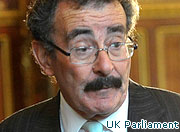Advances in IVF technology could result in the rich creating designer babies, a leading fertility expert has warned.
Professor Lord Robert Winston explained that a growing market for fertility treatments and pressure to improve certain human attributes could mean the return of child eugenics.
Speaking during an international genetics conference at the University of Kent, Professor Winston said: “One of the problems with our work is that we have been carried away with massive enthusiasms in reproduction.
Toxic
“That mixture of enthusiasm and patient desperation is actually a very toxic and heady mixture.
“It is worthwhile standing back a little from the technologies that we employ”, he added.
He warned that we may “end up with a society where some people may actually have something that might threaten our humanity”.
Enhancement
Lord Winston argued that in due course, rich people could be able to pay for “the kind of enhancement to their genetics that other poor people may not be able to afford”.
“In a world where there is conflict, where there is shortage of resources, shortage of water, shortage of food, climate change, I don’t think it is impossible that this is necessarily going to die out”, he continued.
Josephine Quintavalle, of campaign group Comment on Reproductive Ethics, supported Lord Winston’s comments, saying that advances in fertility technology give people the chance to think about having a perfect baby.
Expert
And Philippa Taylor, of the Christian Medical Fellowship, said: “If Lord Winston is saying this, I hope that people take notice. He is someone who is an expert in the area but also someone who sees the bigger picture.”
Later this year, Parliament is to debate allowing a controversial technique which uses IVF to create a baby with DNA from three parents.
In February, the Department of Health launched a consultation on draft regulations on the detail of the procedure, which aims to prevent mothers passing on mitochondrial disease to their children.
A ComRes poll, commissioned by The Christian Institute, found that the three-parent embryo proposals are a vote-loser for the Conservative Party.
More than a quarter (27 per cent) of those surveyed said they are less likely to vote Tory at the upcoming European elections because of the proposals, whereas just three per cent are more inclined to back the Party over the issue.

